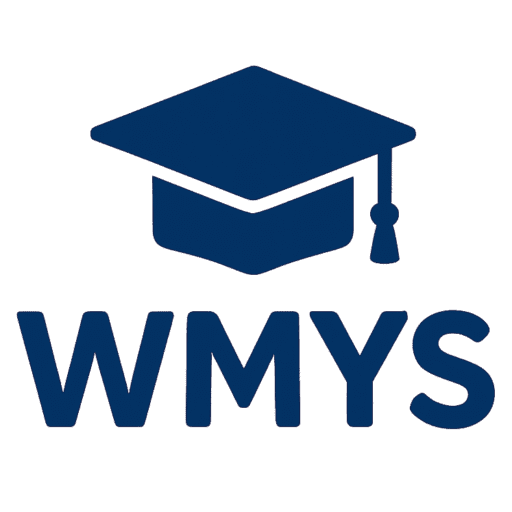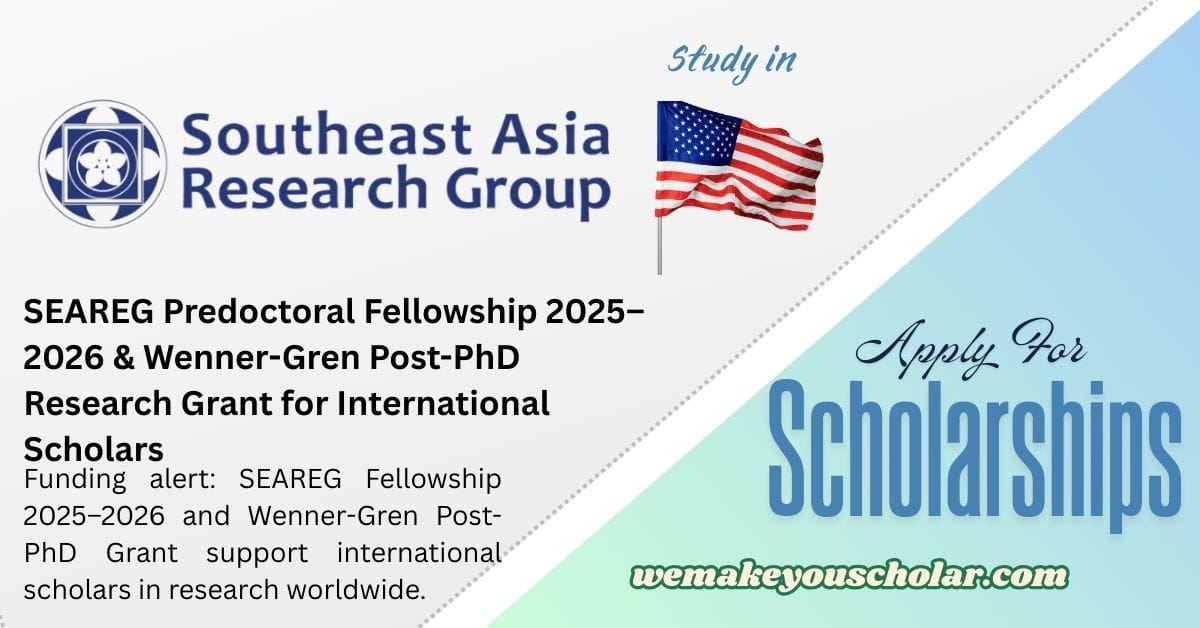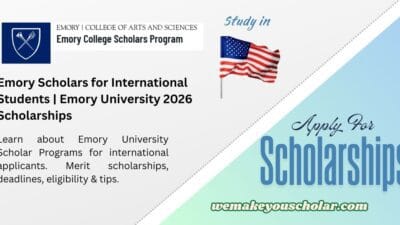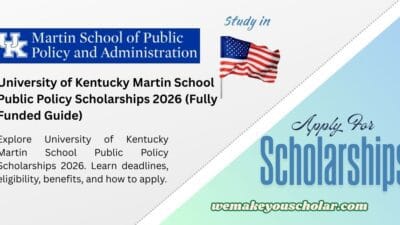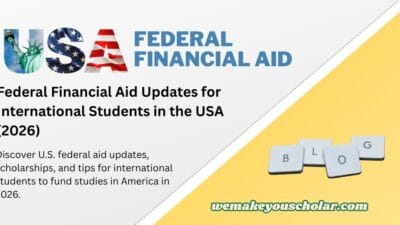SEAREG Predoctoral Fellowship 2025–2026 and Wenner-Gren Post-PhD Research Grant: Fully Explained for International Scholars
International students and early-career researchers are constantly searching for funding opportunities that can help them advance their academic journeys. Two major programs stand out in 2025–2026: the SEAREG Predoctoral Fellowship and the Wenner-Gren Post-PhD Research Grant. Both offer financial support, global exposure, and academic enrichment for scholars dedicated to impactful research. This article provides a comprehensive guide, breaking down eligibility, benefits, deadlines, and application strategies for international applicants. By the end, you will know whether one of these programs fits your academic and professional goals.
Introduction to SEAREG Predoctoral Fellowship 2025–2026
The SEAREG Predoctoral Fellowship is designed to support doctoral candidates conducting advanced research in Southeast Asia-related fields. The fellowship provides a grant of $1,000 and is open to predoctoral students from around the world. It is particularly valuable for those who require fieldwork experience, data collection, or regional engagement opportunities in Southeast Asia.
Key Details at a Glance
- Fellowship Name: SEAREG Predoctoral Fellowship 2025–2026
- Grant Amount: $1,000
- Eligibility: Predoctoral students, particularly those researching Southeast Asia
- Duration: Flexible; depends on project design
- Deadline: Refer to official SEAREG call (2025/2026 cycle)
- Location: Global, with emphasis on Southeast Asia
Eligibility Criteria
The fellowship is intended for predoctoral researchers at any accredited institution worldwide. Applicants must be actively enrolled in a PhD program and conducting research related to Southeast Asia. International students are highly encouraged to apply, making this an inclusive program for diverse applicants.
Funding Benefits
Each selected fellow receives $1,000 to support their fieldwork or research project. While this may appear modest compared to large scholarships, it is often sufficient to cover travel, survey expenses, or data acquisition crucial for dissertation progress. Additionally, fellows benefit from networking opportunities within the SEAREG community of scholars.
Application Process
The application process typically requires the following:
- A detailed research proposal (1,000–1,500 words)
- CV or resume highlighting academic achievements
- Recommendation letter(s) from faculty advisors
- Timeline and budget breakdown for the proposed project
Applicants should clearly demonstrate the significance of their work and how the fellowship funds will be used effectively.
Why International Students Should Apply
The SEAREG fellowship offers an entry point into globally connected academic networks. For international students, especially those from the Global South, the grant not only provides financial aid but also elevates their visibility within the international research community.
Introduction to Wenner-Gren Post-PhD Research Grant
The Wenner-Gren Foundation is one of the most prestigious organizations supporting anthropological research worldwide. Its Post-PhD Research Grant funds individual research projects led by doctorates in anthropology or related disciplines. With a maximum award of $25,000, this program is particularly attractive for experienced researchers aiming to expand human knowledge through field-based or theoretical work.
Key Details at a Glance
- Grant Name: Wenner-Gren Post-PhD Research Grant
- Funding: Up to $25,000
- Eligibility: Holders of PhD in Anthropology or related fields, independent scholars
- Application Deadlines: May 1 and November 1 annually
- Duration: Flexible (10–24 months or according to project design)
- Nationality: Open to all nationalities
Eligibility Criteria
Applicants must hold a PhD or be within five months of completing their doctorate by the project start date. Both affiliated scholars (at universities or research institutions) and independent scholars are eligible. The program is open to applicants of all nationalities.
Funding Benefits
Successful applicants receive up to $25,000. The grant can cover research costs, travel, equipment, or other project-related expenses. However, institutional overhead or administrative fees are excluded. This ensures that funds directly support the researcher’s work.
Application Process
The application requires:
- Research abstract and project proposal
- Responses to six detailed questions about the project’s goals and methodology
- Plan A and Plan B budgets (best- and worst-case scenarios)
- Bibliography of relevant academic sources
- Timeline and permit requirements (if applicable)
Applications are submitted online through the Wenner-Gren Foundation’s portal. Reviewers evaluate based on quality, feasibility, and contribution to anthropology.
Evaluation Criteria
The selection committee assesses applicants using three main dimensions:
- Academic Qualification: Past performance, relevant experience, and language skills.
- Quality of the Study Project: Clear research question, detailed methodology, and alignment with academic debates.
- Applicant Potential: Motivation, personal commitment, and potential contribution to anthropology.
Why International Students Should Apply
The Wenner-Gren Foundation welcomes applications from scholars worldwide, making it a rare opportunity for international academics. The grant’s flexibility allows for fieldwork in diverse regions, giving non-U.S. applicants the chance to highlight research that bridges global perspectives.
Comparing SEAREG and Wenner-Gren Opportunities
While both programs support research, they target different academic stages:
- SEAREG: Ideal for predoctoral students needing modest support for dissertation fieldwork.
- Wenner-Gren: Best for postdoctoral researchers with established careers seeking large-scale funding.
Together, they provide a pipeline of opportunities, from early-stage doctoral support to post-PhD independence.
Tips for International Applicants
- Start preparing early to meet deadlines.
- Tailor your proposal to the specific mission of the funding body.
- Highlight your unique perspective as an international scholar.
- Demonstrate how your research contributes to global debates.
- Seek guidance from mentors and past fellows.
Frequently Asked Questions (FAQs)
1. Can I apply to both SEAREG and Wenner-Gren?
Yes. As long as you meet the eligibility requirements for each program, you may apply to both. However, you must manage deadlines and tailor your proposals accordingly.
2. Are there restrictions for international applicants?
No. Both programs are open to all nationalities. However, Wenner-Gren requires compliance with U.S. regulations, including OFAC rules for certain regions.
3. How competitive are these awards?
Both fellowships are competitive. SEAREG provides a smaller number of awards, while Wenner-Gren receives global applications from established scholars. Strong proposals stand out.
4. Can I use the Wenner-Gren grant for multiple project phases?
Yes, applicants may propose funding for distinct phases such as multiple summers of fieldwork, as long as this fits the overall design.
5. When will I hear back after applying?
Wenner-Gren applicants receive a decision about six months after the deadline. SEAREG timelines vary but are usually within a few months of submission.
Conclusion
For international scholars aiming to expand their research capabilities, the SEAREG Predoctoral Fellowship and the Wenner-Gren Post-PhD Research Grant represent excellent funding opportunities in 2025–2026. Whether you are an early-stage doctoral candidate or an experienced anthropologist, these programs provide financial aid, credibility, and global academic visibility. By preparing a strong, thoughtful application, you could secure the support needed to advance your academic journey.
